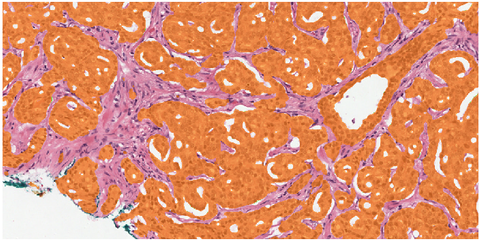
Background
Histopathological grading of cancer is the most important step to assess a patients’ risk of dying due to the disease and, in a large part, determines the appropriate therapy for a patient. Grading is typically performed by a pathologist by microscopically inspecting tissue taken from the patient. The key problem is that between pathologists the assigned grade can substantially differ, which can result in inappropriate risk assessment and treatment for the patient. In our group we have developed AI algorithms to help support the pathologist in breast and prostate cancer grading and have shown that these algorithms can reduce variability among pathologists. Now we aim to take the next step and bring these algorithms to the clinic, which will entail a close collaboration between industry, clinicians and researchers. Within this project you will be at the center of these developments. You will help further improve the algorithms and make them robust to variation encountered in the clinic, build algorithms which can detect rare anomalies, work with pathologists to identify the most efficient way to use the algorithms in practice, and work with our partner company Thirona to develop a commercial product around the algorithms.
Requirements
You are a creative and ambitious researcher with a MSc degree in Computer Science, Data Science, Engineering, Technical Medicine, Biomedical Sciences or similar, with a clear interest in artificial intelligence and medical image analysis. Good communication and organizational skills are essential. Experience with deep learning and programming, preferably in Python, are a plus and should be evident from the (online) courses you've followed, your publications, GitHub account, etc.
Terms of employment
You will be appointed for four years as a PhD student with the standard salary and secondary conditions for PhD students in the Netherlands. The research should result in a PhD thesis.
Organization
The Computational Pathology Group is a research group of the department of Pathology of the Radboud University Medical Center (Radboudumc). We are also part of the cross-departmental Diagnostic Image Analysis Group (DIAG) at Radboudumc, with researchers in the departments of Radiology and Nuclear Medicine, Pathology and Ophthalmology. We develop, validate and deploy novel medical image analysis methods, usually based on deep learning technology and focusing on computer-aided diagnosis (CAD).
Application areas include diagnostics and prognostics of breast, colon, prostate and lung cancer. Our group is among the international front runners in the field, witnessed for instance by the highly successful CAMELYON16/17 and PANDA grand challenges which we organized. Within this project you will also work with our industrial partners.
Information
For more information please contact Geert Litjens by e-mail.
Application
Please apply here!
